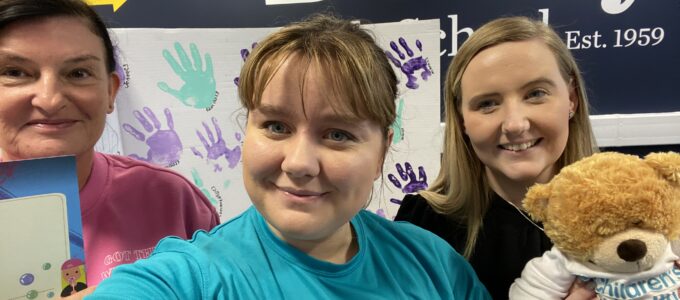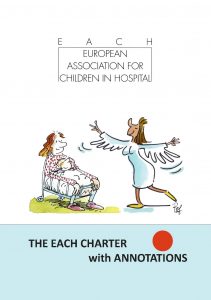
At Children’s Health Scotland, through our direct work with children and young people with health conditions, we know that there are many reasons why they may miss out on attending school. Of course, these will be different for each individual child because every child is unique but without doubt there is now growing concern in Scotland on the increasing number of children and young people missing out on going to school.
Commenting on school attendance Rhianne Forrest, Health Rights Officer at Children’s Health Scotland said: “The United Nations Convention on the Rights of the Child Bill will come into force on 16 July 2024. Article 28 states that children and young people have the right to education, no matter who they are, so we believe a change is needed right now within our education system to form and shape a society that actively upholds the rights of its youngest members, fostering a culture of compassion, understanding, and social responsibility.
“Right now, high rates of anxiety levels for children and young people are being reported which does make it harder for them to return to school when they’ve missed out on social occasions, interactions, and events. On top of that during COVID-19 they were told to stay home, stay safe. They were told to do this to protect others and to stop the spread of an illness, with school was painted like a petri dish of diseases and danger. Now they are being told to return, all is well, and everything is safe after they have experienced something that no other generation can relate to. Children and young people’s fight, flight or freeze brains are kicking into overdrive, and they are navigating a new world that doesn’t feel as stable as it once did.
“Right now, we are being faced with mounting reports talking about school non-attendance at an all-time high. Pupils living in the 20% most deprived areas in Scotland had an attendance rate of 86.8% in 2023, compared to those living in the 20% least deprived areas who had an attendance rate of 93.5% (The Scottish Government summery statistics for schools in Scotland 2023).
“In relation to this I would strongly recommend thinking of the language being used when talking about school non-attendance. It’s extremely important and there does appear to be a lack of empathy when the UK Government recently launched a series of posters seemingly encouraging getting children and young people into school, no matter how they are feeling. There is a lot going on in the life of children and young people in Scotland 2024– they aren’t staying away from school simply for a runny nose.
“These children and young people aren’t refusing to go to school. Their anxiety is so high that it isn’t allowing them to go to school. Changing this language and understanding can help to support the building of self-confidence, self-esteem and social inclusion and being empathetic to the situation that a lot of children and young people are now facing. This is crucial in supporting children and young people to have a positive relationship with their school community.
“Children’s Health Scotland recently piloted a Programme with NHS Forth Valley to help address some of the issues surrounding school non-attendance at Denny High School. We developed a bespoke Self-Management Skills Programme which was co-designed by children and young people for children and young people. The Programme was aimed at helping to improve the confidence and self-esteem of these school non-attenders, whilst helping them to face their feelings of social isolation. Knowing rights was of course included but the Programme was focused on fun, learning and the development of self-management skills to help them feel more in control when those feelings of anxiety might start to surface.
“By the end of our pilot Programme at Denny High School 80% of the young people we supported reported said their confidence had improved, 70% reported having higher self-esteem and 100% felt more socially included. The Programme was an important step forward to giving young people the tools to start to understand their relationship with the health and wellbeing – enabling them to think about having positive outcomes and experiences when attending school. It encouraged them to take back control of their lives and their future life choices.
“A conclusion from our pilot was that when we put young people at the centre and actively listen to them, we can come up with effective Programmes that encourage active participation and engagement. With UNCRC coming into force it is now more important than ever to defend the rights of children and young people.
“Article 28 states that children and young people have the right to education no matter who they are: regardless of race, gender, or disability; if they’re in detention, or if they’re a refugee. And Article 29 states that a child or young person’s education should help their mind, body and talents be the best they can.
“So every child has the explicit right to education and a right to be supported and respected during times when their anxiety isn’t allowing them to attend school. Our SMS Programmes are a step in the right direction to helping young people attend school. With empathy, understanding and respect we’ve shown that helping children and young people to develop self-management tools and skills boosts their confidence, self-esteem, and engagement with the school community. If adults come together to understand and get it right for every child, then we can help shape a generation of children who listen, understand, and support one another – just look at them now.”
DENNY HIGH SCHOOL HEALTHIER FUTURES PROGRAMME
Children’s Health Scotland has worked with the Healthier Futures, Why Weight Team at NHS Forth Valley for several years. During this time, a group of young people at Denny High School were identified who could benefit from our SMS Programme but who had barriers to easily engaging with support, particularly online. So, using feedback from our young people and engaging with our young volunteers’ group, we co-designed a bespoke SMS Schools Programme that runs over five weeks, with each week containing a two-hour block session.
Talking about the SMS Healthier Futures Programme, Michelle Wilson who is Head of Service at Children’s Health Scotland said: “The Healthier Futures, Why Weight team had been working with Denny High school running a successful cookery skills Programme. Based on this success we decided together that if Denny High School were on board, this would be the ideal school for us to pilot our new SMS Healthier Futures Schools Programme. The school agreed, so to generate interest we co-developed a presentation and asked the young people interested in coming along to complete a questionnaire with us.
“Based on our learning with young people over many years, we suggested that the Programme should be tailored for a mixed age group rather than targeting a particular year group which would help with engagement. It was the first time we had run any SMS Programme without meeting the young people first, so we were a little apprehensive. However, we knew we had something special, so we factored in some good getting to know you games to play at the start of the Programme which was well received. As always play is central to learning.
“We couldn’t have been more delighted with the success of the Programme that we delivered successfully over the Summer to October Term. There was one young person who didn’t turn up on week one and two who didn’t return after the first session but after that we had a 100% complete the whole programme. Based on the initial feedback we are now actively seeking funding to help us rung further Programmes this year.”
Feedback the young people on the pilot Programme included:
“I really liked getting to know each other and show how each other copes with stress. It meant I didn’t feel alone”.
“It let me have a break from school, but I was still learning important stuff. I liked that I didn’t feel nervous, and everyone made me feel included. It made me want to come to school. I got to see that people are like me and that everyone can feel nervous about school.”
Feedback from the school was extremely positive too:
“Pupils have engaged so positively with the Programme and have continued to come back week on week. We would love to have more like because the feedback from students has been overwhelmingly positive. It’s made such a difference.”
Michelle added: “We feel incredibly proud of the new SMS Healthier Futures School Programme and of our skilled staff. We are all in agreement that when we put young people at the centre and listen to them, we can come up with effective Programmes that encourage active participation and engagement.”
If you would like to talk to us about an SMS Programme, please get in touch by emailing sms@childrenshealthscotland.org or calling 0131 553 6553.
